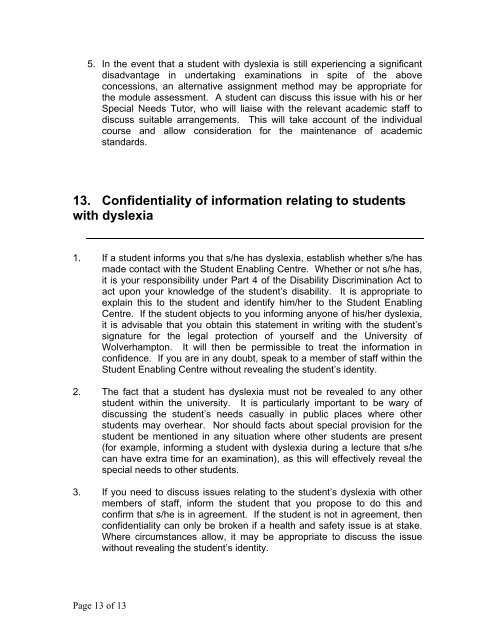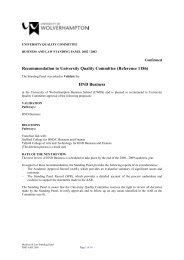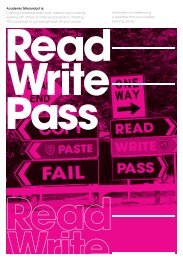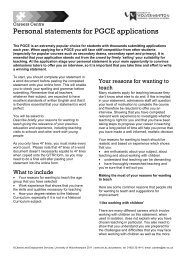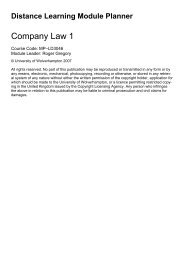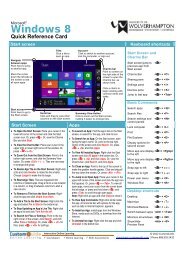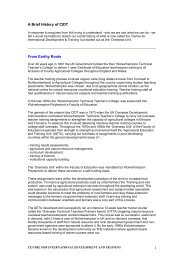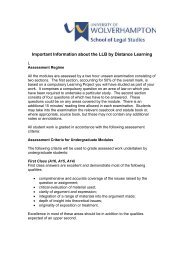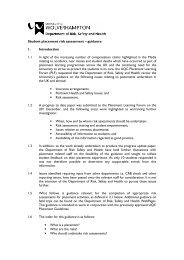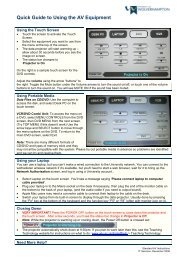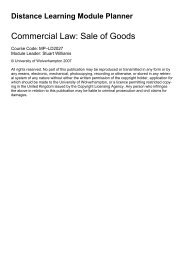Guidelines for Marking the work of Students who - University of ...
Guidelines for Marking the work of Students who - University of ...
Guidelines for Marking the work of Students who - University of ...
- No tags were found...
You also want an ePaper? Increase the reach of your titles
YUMPU automatically turns print PDFs into web optimized ePapers that Google loves.
5. In <strong>the</strong> event that a student with dyslexia is still experiencing a significantdisadvantage in undertaking examinations in spite <strong>of</strong> <strong>the</strong> aboveconcessions, an alternative assignment method may be appropriate <strong>for</strong><strong>the</strong> module assessment. A student can discuss this issue with his or herSpecial Needs Tutor, <strong>who</strong> will liaise with <strong>the</strong> relevant academic staff todiscuss suitable arrangements. This will take account <strong>of</strong> <strong>the</strong> individualcourse and allow consideration <strong>for</strong> <strong>the</strong> maintenance <strong>of</strong> academicstandards.13. Confidentiality <strong>of</strong> in<strong>for</strong>mation relating to studentswith dyslexia1. If a student in<strong>for</strong>ms you that s/he has dyslexia, establish whe<strong>the</strong>r s/he hasmade contact with <strong>the</strong> Student Enabling Centre. Whe<strong>the</strong>r or not s/he has,it is your responsibility under Part 4 <strong>of</strong> <strong>the</strong> Disability Discrimination Act toact upon your knowledge <strong>of</strong> <strong>the</strong> student’s disability. It is appropriate toexplain this to <strong>the</strong> student and identify him/her to <strong>the</strong> Student EnablingCentre. If <strong>the</strong> student objects to you in<strong>for</strong>ming anyone <strong>of</strong> his/her dyslexia,it is advisable that you obtain this statement in writing with <strong>the</strong> student’ssignature <strong>for</strong> <strong>the</strong> legal protection <strong>of</strong> yourself and <strong>the</strong> <strong>University</strong> <strong>of</strong>Wolverhampton. It will <strong>the</strong>n be permissible to treat <strong>the</strong> in<strong>for</strong>mation inconfidence. If you are in any doubt, speak to a member <strong>of</strong> staff within <strong>the</strong>Student Enabling Centre without revealing <strong>the</strong> student’s identity.2. The fact that a student has dyslexia must not be revealed to any o<strong>the</strong>rstudent within <strong>the</strong> university. It is particularly important to be wary <strong>of</strong>discussing <strong>the</strong> student’s needs casually in public places where o<strong>the</strong>rstudents may overhear. Nor should facts about special provision <strong>for</strong> <strong>the</strong>student be mentioned in any situation where o<strong>the</strong>r students are present(<strong>for</strong> example, in<strong>for</strong>ming a student with dyslexia during a lecture that s/hecan have extra time <strong>for</strong> an examination), as this will effectively reveal <strong>the</strong>special needs to o<strong>the</strong>r students.3. If you need to discuss issues relating to <strong>the</strong> student’s dyslexia with o<strong>the</strong>rmembers <strong>of</strong> staff, in<strong>for</strong>m <strong>the</strong> student that you propose to do this andconfirm that s/he is in agreement. If <strong>the</strong> student is not in agreement, <strong>the</strong>nconfidentiality can only be broken if a health and safety issue is at stake.Where circumstances allow, it may be appropriate to discuss <strong>the</strong> issuewithout revealing <strong>the</strong> student’s identity.Page 13 <strong>of</strong> 13


